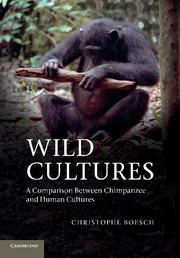Crossref Citations
This Book has been
cited by the following publications. This list is generated based on data provided by Crossref.
Wayman, Erin
2013.
Group to group: Wild chimpanzees pick up ant‐fishing behavior from a female immigrant.
Science News,
Vol. 183,
Issue. 3,
p.
20.
Gowlett, J. A. J.
2013.
Elongation as a factor in artefacts of humans and other animals: an Acheulean example in comparative context.
Philosophical Transactions of the Royal Society B: Biological Sciences,
Vol. 368,
Issue. 1630,
p.
20130114.
Moore, Richard
2013.
Imitation and conventional communication.
Biology & Philosophy,
Vol. 28,
Issue. 3,
p.
481.
Moore, Richard
2013.
Social learning and teaching in chimpanzees.
Biology & Philosophy,
Vol. 28,
Issue. 6,
p.
879.
Fragaszy, D. M.
Biro, D.
Eshchar, Y.
Humle, T.
Izar, P.
Resende, B.
and
Visalberghi, E.
2013.
The fourth dimension of tool use: temporally enduring artefacts aid primates learning to use tools.
Philosophical Transactions of the Royal Society B: Biological Sciences,
Vol. 368,
Issue. 1630,
p.
20120410.
Möller-Leimkühler, A.M.
and
Bogerts, B.
2013.
Kollektive Gewalt.
Der Nervenarzt,
Vol. 84,
Issue. 11,
p.
1345.
Keller, Heidi
2013.
Attachment and Culture.
Journal of Cross-Cultural Psychology,
Vol. 44,
Issue. 2,
p.
175.
Whiten, Andrew
2014.
Incipient tradition in wild chimpanzees.
Nature,
Vol. 514,
Issue. 7521,
p.
178.
Parlar, Ugur
2014.
On Higher Altitudes: Unfolding the Six Paths of Sentient Ecological Engagement.
Ecopsychology,
Vol. 6,
Issue. 2,
p.
116.
Leavens, David A.
2014.
Enactive Cognition at the Edge of Sense-Making.
p.
81.
Bains, William
2014.
What do we think life is? A simple illustration and its consequences.
International Journal of Astrobiology,
Vol. 13,
Issue. 2,
p.
101.
2014.
Thérapie neurocognitive et comportementale.
p.
371.
Bard, Kim A.
Bakeman, Roger
Boysen, Sarah T.
and
Leavens, David A.
2014.
Emotional engagements predict and enhance social cognition in young chimpanzees.
Developmental Science,
Vol. 17,
Issue. 5,
p.
682.
Bard, Kim A.
and
Leavens, David A.
2014.
The Importance of Development for Comparative Primatology.
Annual Review of Anthropology,
Vol. 43,
Issue. 1,
p.
183.
Moore, Richard
and
Tennie, Claudio
2015.
Cognitive mechanisms matter – but they do not explain the absence of teaching in chimpanzees.
Behavioral and Brain Sciences,
Vol. 38,
Issue. ,
Marino, Lori
2015.
The Impact of Discovering Life beyond Earth.
p.
95.
Blomberg, Olle
2015.
Collective Agency and Cooperation in Natural and Artificial Systems.
p.
169.
Whiten, Andrew
2015.
Experimental studies illuminate the cultural transmission of percussive technologies inHomoandPan.
Philosophical Transactions of the Royal Society B: Biological Sciences,
Vol. 370,
Issue. 1682,
p.
20140359.
Neubauer, Raymond L.
2015.
Evolutionary Perspectives on Social Psychology.
p.
97.
Leavens, David A.
Reamer, Lisa A.
Mareno, Mary Catherine
Russell, Jamie L.
Wilson, Daniel
Schapiro, Steven J.
and
Hopkins, William D.
2015.
Distal Communication by Chimpanzees (Pan troglodytes): Evidence for Common Ground?.
Child Development,
Vol. 86,
Issue. 5,
p.
1623.





